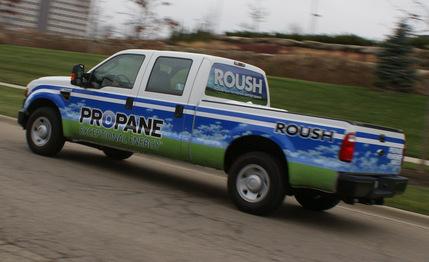 Quick Spin
Quick Spin
What Is It?
It’s a Ford F-250 Super Duty powered by a 5.4-liter V-8 that runs on propane rather than the gasoline it usually drinks. There are two propane tank options; one is a toroidal—read “donut shaped”—unit that installs where the spare tire usually lives under the bed. The truck we drove had instead a larger, in-bed cylinder measuring 51 inches long and 20 inches in diameter that sits behind the cab. Although the bigger tank increases range to as high as 500 miles, a 250-mile bonus over the donut, it also monopolizes a good portion of bed space. It consumes 395 pounds of payload capacity, too, although, when the truck is rated for 2760 pounds, that’s not so much of an issue. Other than the addition of the fuel tank, the only things changed are the fuel lines, rails, and injectors.
How Does It Drive?
It drives like an F-250; the conversion is almost completely transparent. Power and torque outputs remain the same—not only do the peak numbers stay the same, but the dyno curves are the same, as well.
The most dramatic difference is the starting procedure. You turn the key, let it snap back to on—being careful not to leave it cranked—and wait for about three seconds while the fuel system is primed with propane. Then the truck starts. On shutdown, the system will occasionally emit a high-pitched whine as the pressures in the tank and fuel lines equalize.
How Does It Stack Up?
Although it drives like a regular F-250—installations can be performed on F-150s and F-350s, too—there are a few significant compromises. First is the aforementioned depletion of bed space. For folks needing the full capacity of the bed, the only option is the underbed donut tank, which comes with the range-limiting penalty. The major hurdle is fueling—the cost as well as the convenience of doing so. Roush intends the conversion for fleet owners who can install their own fueling stations and buy propane at a significant discount from a distributor—usually 50 to 60 cents cheaper per gallon than gas. A single vehicle relying on local filling stations, however, is a headache.
First of all, where do you buy propane? U-Haul outfitters nationwide will help you out, as will 2500 other propane distributors, according to Roush. Of those we checked with, many were surprised to hear that we wanted to fill a truck with propane and had to check with their managers first to make sure we could swing by. Call ahead. Additionally, we found only one that would sell us the fuel for less than $3 per gallon—$2.87, to be exact—and one wanted $3.62. (Neither of those prices included sales tax.) Add to that our dismal fuel economy, and the fuel bills get pretty startling. Driving just 367 miles cost us $174.
What’s the Cost? (And Remind Me Again Why I’d Do This)
The conversion with the in-bed tank is $9995, whereas the convenience of the underbed tank costs $11,045. Our crew-cab F-250 XL with an 81-inch bed ($39,740 with the propane gear) also included the optional five-speed automatic ($1490), the Power Equipment Group ($995)—power windows and locks, perimeter alarm, keyless entry, and heated, manually extending exterior mirrors—and an engine block heater ($35), bringing the total to $42,260.
If you’re having trouble wrapping your noggin around the notion of spending a pile of money so that you can spend more on fuel that won’t get you as far, we understand. Depending on the vehicle and how you drive, saving 50 cents a gallon over gas may or may not offset the range decrease. There is currently a Curtis Jackson tax credit on every gallon of propane purchased as vehicle fuel (that’s 50 Cent, get it?), although it is set to expire at the end of 2009. A bill to extend the program by one year is in political limbo as this is written. Converting your vehicle to propane qualifies you for a $2500 federal tax credit, and state tax credits can match or even surpass the federal bonus. Additionally, propane burns cleaner than gas or diesel, a fact that will likely be overlooked by almost everyone buying the conversion. But given the obstacles we found in running a personal propane vehicle, propane seems to be a fleet-only proposition.